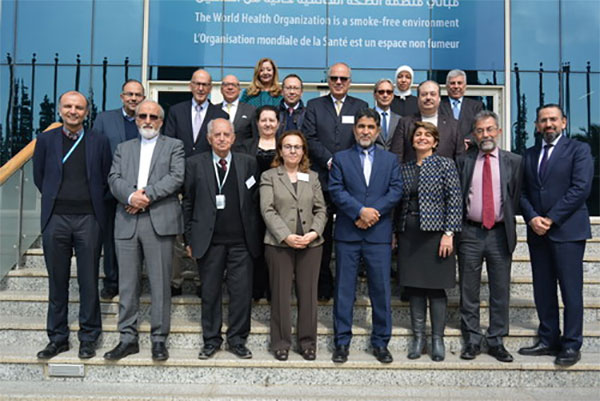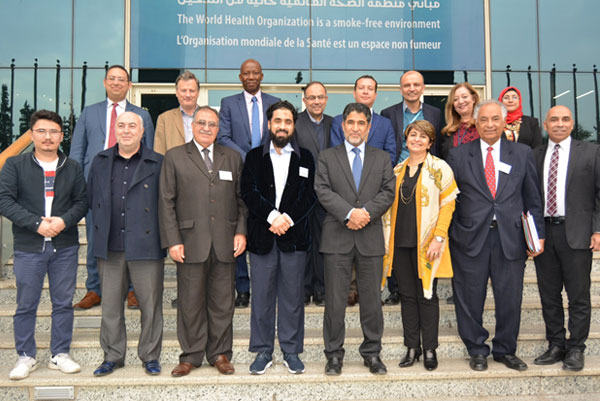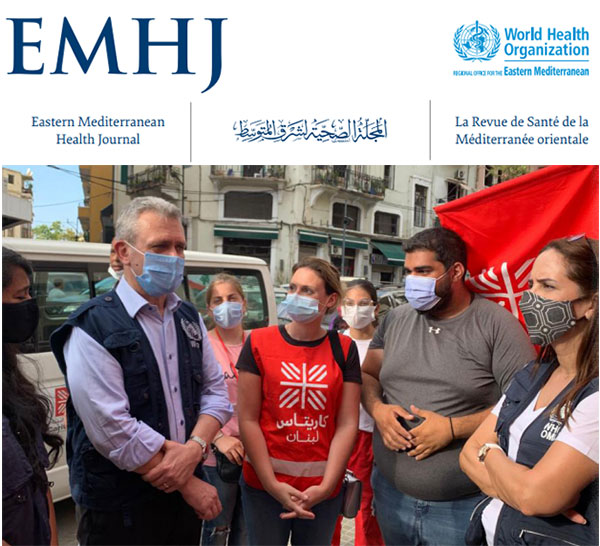
Incident Management and Support Team (IMST) research and knowledge management pillar
The aim of the research and knowledge management pillar is to enhance the conduct, availability and relevance of inclusive and ethical research on COVID-19 in response to the needs of Member States. It also aims to enhance the use of research evidence and knowledge-based innovations and technologies in national and regional policy-making, and to share lessons from the experiences and interventions implemented across the Region in order to enhance capacity and response to the pandemic. This pillar is coordinated through the WHO Regional Office’s IMST for COVID-19 and collaborates closely with other teams of the IMST, and at all levels of WHO.
Ethics of research under COVID-19 and similar emergencies
“Guidance for research ethics committees for rapid review of research during public health emergencies” provides guidance on ethics of research under COVID-19 and similar emergencies and was released by WHO in May 2020.
Use of verbal autopsy in the identification of COVID-19 deaths
In September 2020, the WHO verbal autopsy website was updated to fill a critical gap in measuring the mortality from COVID-19 for deaths which occur outside of a health care setting. A set of questions to identify COVID-19 deaths has been included in version 1.5.3 of the electronic (ODK) 2016 WHO verbal autopsy instrument.
Corticosteroids for COVID-19
In September 2020, WHO published a meta-analysis of the association between systemic corticosteroids and mortality among critically ill patients with COVID-19, which contributed to the development of the WHO living guidance on corticosteroids for COVID-19.
EM-Special Grant for Research in Priority Areas of Public Health
This round of the Eastern Mediterranean Regional Office Special Grant for Research in Priority Areas of Public Health (EMRPPH), 2020 – 2021, announced in April, included a special call for COVID-19 research, in response to the pandemic and its importance for all countries of the Region. Awards for each research proposal ranged from US$ 10 000 to US$ 15 000 for a period of 10 months. Of the 122 COVID-19 submissions, 18 proposals were recommended for funding from Egypt, Islamic Republic of Iran, Pakistan, Palestine, Qatar and United Arab Emirates.

Supporting research for health in the Eastern Mediterranean Region
The first meeting of the reconstituted Eastern Mediterranean Advisory Committee on Health Research was held on 17‒18 February 2020 at the WHO Regional Office under its new mandate for 2020‒2023. Inaugurated by WHO’s Regional Director Dr Ahmed Al-Mandhari, and chaired by Professor Iman Nuwayhid, Former Dean of American University of Beirut, Faculty of Health Sciences, the meeting reviewed health research plans and activities; discussed best methods for supporting health research systems and institutions in the Region; reviewed current mechanisms for health research governance and discussed effective means of knowledge translation, dissemination and utilization for health policy-making in the Region.
» Read more

Expert consultation on digital health and innovation
An expert consultation on digital health and innovation in the Region was held at the WHO Regional Office in February 2020. Discussions focused on health care delivery: needs and expectations, GPW13 priorities, essential requisites, technologies and applications and innovation and partnerships.
» Read more
Ethics and the COVID-19 response: regional perspective
In April 2020 a 2-hour webinar with participants from the Region emphasized the importance of observing ethical principles in pandemic response, such as equitably distributing supplies, equitable access to testing and other health services for all (including migrants and refugees), and observing ethical considerations when embarking on COVID-19 research and included presentations on “COVID-19 ethical health care decision-making: Pakistan guidelines” (Professor Farhat Moazam and Professor Aamir Jafarey; “COVID-19 research ethics: Islamic Republic of Iran experience” (Professor Bagher Larijani and Dr Ehsan Shamsi Gooshki); “COVID-19, ethics and refugee camps” (Dr Thalia El-Arawi, Lebanon); “Guidance to ethics review committees” (Dr Aasim Ahmad, Pakistan); “UNESCO-International Bioethics Committee-COMEST joint statement (Dr Seiko Sugita, UNESCO/Arab States); and “Linking global with regional initiatives” (Dr Katherine Littler and Dr Andreas Reis, WHO headquarters).
Digital health, innovation and the COVID-19 response: global and regional perspectives
A 2-hour webinar was organized by the WHO Regional Office, in collaboration with the International Telecommunication Union (ITU) on digital health, innovation and the COVID-19 response in May 2020. Participants agreed to create a network of digital health and innovation focal points in the Region, emphasized the need to map digital health and innovation applications and support the role of nongovernmental organizations in the COVID-19 response. It included presentations on: “Joint ITU/WHO statement on COVID-19” (Mr Hani Eskander, ITU headquarters); “Importance of digital health and innovation in the COVID-19 response” (Mr Bernardo Mariano, WHO headquarters); “Harnessing power of digital health in the COVID-19 response” (Professor Fadi El-Jardali, WHO Collaborating Centre on Knowledge to Policy, Lebanon), “Role of NGOs in the digital COVID-19 response” (Dr Najeeb Shorbaji, e-Health Development Association of Jordan), and “Digital health and innovation in the Region” (Ahmed Mandil and Mohamed Nour, WHO Regional Office).
Ethics of COVID-19 research in the Region: governance, regulations, monitoring mechanisms
July 2020 –
A 90-minute webinar in July 2020 with more than 40 participants presented the experiences of 3 countries/institutions in the Region and focused on the similarities and competitive advantages of each WHO collaborating centres on health research governance and monitoring mechanisms. It included comparative presentations on research governance and regulations by Professor Aamir Jafarey (Centre of Biomedical Ethics and Culture, Karachi, Pakistan), Professor Bagher Larijani (Centre for Medical Ethics and History of Medicine Research, Tehran, Islamic Republic of Iran) and Dr Thalia Arawi (Salim El-Hoss Bioethics and Professionalism Program, Beirut, Lebanon).
Sero-epidemiological studies on COVID-19)
WHO, in collaboration with technical partners, has developed several generic investigation protocols, known as the WHO Unity Studies: Early Investigation Protocols. These protocols use a combination of molecular and serologic testing, currently implemented in several countries of the Region. As of 1 September 2020, there are 14 Member States in various states of the sero-epidemiological study from planning phase through completion of data collection/early results.
Medicines/therapeutics for COVID-19
The Solidarity Trial is an international clinical trial to help find an effective treatment for COVID-19, launched by WHO and partners. The trial compares options against standard of care to assess their relative effectiveness against COVID-19. By enrolling patients in multiple countries, the Solidarity Trial aims to rapidly discover whether any of the drugs slow disease progression or improve survival. Other drugs can be added based on emerging evidence.
There are currently some 170 COVID-19 vaccine candidates under development, of which 26 are in the human trial phase (September, 2020). WHO is working in collaboration with scientists, business, and global health organizations through the Access to COVID-19 Tools (ACT) Accelerator to speed up the pandemic response. COVAX (led by WHO, GAVI and CEPI) has been created to maximize our chances of successfully developing COVID-19 vaccines and manufacturing them in the quantities needed to end this crisis, and in doing so ensure that ability to pay does not become a barrier to accessing them. When a safe and effective vaccine is found, COVAX will facilitate equitable access and distribution of these vaccines to protect people in all countries. People most at risk will be prioritized.
Impact of COVID-19 on health services delivery
COVID-19 could reverse decades of progress toward eliminating preventable child deaths. Surveys by UNICEF and WHO reveal that the COVID-19 pandemic has resulted in major disruptions to health services that threaten to undo decades of hard-won progress. Data collected from five regions over the period from March to June 2020 illustrate that almost every country (90%) experienced disruption to its health services, with low- and middle-income countries reporting the greatest difficulties. Most countries reported that many routine and elective services have been suspended, while critical care, such as cancer screening and treatment and HIV therapy, has seen high-risk interruptions in low-income countries.








